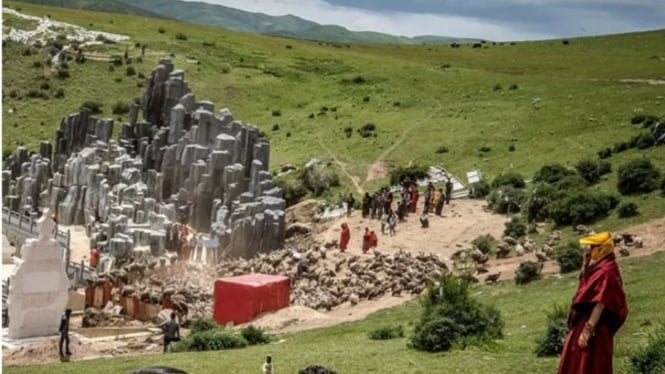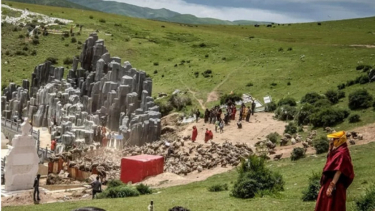Sky Burial in Tibet, Letting Human Corpse at the Top Mountain
VIVA – Tibet is a province of the Republic of China. Tibet is located in the Himalayas that are often said to be the peak of the world, bordered by Nepal, Bhutan, and India. As it turns out, Tibet has an unusual and extreme funeral tradition, the Sky Burial.
People who have died in Tibet will be buried by placing the body on the top of a mountain and allowing the corpse to rot, and the vultures will eat the carcass. For information, the vulture is considered sacred by the Tibetans. Feeding the vultures is considered an act of charity, or final kindness.
Sky Burial was carried out by the people of the provinces of Qinghai, Mongolia, Tibet, and Inner Mongolia. Because, Tibet has a rocky and hilly geographical structure that makes it impossible to create a burial ground.
Burung Sky Burial
Not only that but there is also a scarcity of fuel and wood. So, the bodies cannot be burned as usual. However, not all bodies can be buried with this tradition.
There are several conditions; those aged 18 years and over, women who are not pregnant, and those who died because of accidents or illness cannot perform this ritual.
This funeral tradition is very sacred because it is still carried out in a few Buddhist temples. Many Tibetans believe, that if the ritual is quite extreme and strange, it is also called Jhator. Where this ritual is believed to be able to bring the spirits of the dead bodies directly into heaven.
History of Sky Burial
During the early history of Tibet when the main religion was Bon, earth burial, or simply tombs was the most common burial practice for the noble Tibetans.
In the Yarlung Tsangpo Valley, there is still the tomb of the first Tibetan King. The Valley of the Kings is located outside Tsedang. The most prominent tomb is that of King Songtsen Gampo. At this moment, the tomb looks like a huge hill from the outside.
According to Tibetan records, the tomb of King Songtsen Gampo was supposed to be deep underground with several deep chambers that housed various relics, and artifacts made of silver, gold, and using various precious stones.
Procedure for Practicing Sky Burial
Sky Burial
The exact practice of a Tibetan sky burial may vary slightly depending on the region, and how busy the sky burial site is. After a Tibetan person dies, the family keeps the body at home for the next 3 to 5 days. During that time, the monks visited the house to recite prayers and also read Bardo Thodol – the Tibetan Book of the Dead.
The book explains what spirits encounter during the process of rebirth. After that, the body is ready for celestial burial. Sky burial sites are usually high in the mountains, where vultures congregate.
The site is often just a flat stone slab. The area around it is marked with hundreds of prayer flags. The body's back was broken and the body was carried to the top of the mountain. Tumden, a body breaker, burns juniper incense to attract vultures.
Let the vultures eat the human corpse's body. After more or less only 10-15 minutes, the birds left only the carcass of the body.
Then, the master crushes the bone with a hammer and mixes it with a Tsampa of roasted barley flour and mixes it with Tibetan butter tea. Vultures, as well as ravens and eagles, devoured every part of the body.
This is a bad sign if the vultures don't finish eating the body. Tibetans believe that it is the result of one's bad deeds.
Family members did not attend the ceremony. They stay at home and pray. Over the next 49 days, the family will ask for prayers from the lamas. According to Bardo, after seven weeks the spirit will be reborn.
Location of the Sky Burial
Sky Burial di Tibet, ritual mayat dengan cara diletakan di area lapang dan jadi santapan burung pemakan daging | gambar: silahkanshare.com
- vstory
This sacred ritual can be seen by visitors on a hill as high as 4,150 meters above sea level near the Drigung Temple, Lhasa, Tibet. The funeral procession cannot be carried out by non-family members of the deceased.
This funeral tradition will be carried out for followers of Vajrayana Buddhism. They believe the ritual can also save the lives of vultures.
Although it looks extreme and strange, this sky burial ritual is full of religion and culture for its adherents.






























